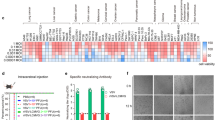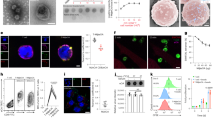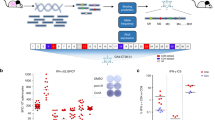Abstract
There are currently extensive studies relating to cancer vaccines using tumor cells engineered to express immunogenes and cancer gene therapy using adenovirus (AdV)-mediated gene transfer. In this study, a mouse tumor cell line, VKCK, was cotransfected with genes coding for tumor necrosis factor-α (TNF-α) and costimulatory B7-1 molecule to enhance immunogenicity. The transfectant cell line VKCK-TNF-α/B7-1 showed reduced tumorigenicity and tumor regression. Its inoculation further induced protective immunity; both CD4+ and CD8+ T cells were involved in the induction phase, whereas only CD8+ T cells mediated the effector phase. Susceptible mice bearing VKCK tumors developed a T helper type 2-dominant response, whereas resistant mice with VKCK-TNF-α/B7-1 tumor regression developed a T helper type 1-dominant response to VKCK, indicating that the tumor regression was related to a shift in the cytokine profile of the host from type 2 to type 1. Vaccination of VKCK-TNF-α/B7-1 cells inhibited tumor formation derived from a single dose of 3 × 106 VKCK cells and eradicated 3-day tumors but not 10-day tumors. AdV-mediated TNF-α gene transfer by intratumoral injection of AdV-TNF-α significantly inhibited tumor growth but failed to eradicate any well-established tumors. However, combinational immunotherapy with vaccination of VKCK-TNF-α/B7-1 cells and AdV-mediated TNF-α gene transfer not only significantly inhibited tumor growth but also eradicated 10-day VKCK tumors in three of eight mice. Therefore, the present study may be useful not only in understanding the mechanisms responsible for an efficient antitumoral immunity, but also in establishing a more effective immunotherapeutic approach for cancer patients.
This is a preview of subscription content, access via your institution
Access options
Subscribe to this journal
Receive 12 print issues and online access
$259.00 per year
only $21.58 per issue
Buy this article
- Purchase on Springer Link
- Instant access to full article PDF
Prices may be subject to local taxes which are calculated during checkout
Similar content being viewed by others
Author information
Authors and Affiliations
Rights and permissions
About this article
Cite this article
Xiang, J., Chen, Y. & Moyana, T. Combinational immunotherapy for established tumors with engineered tumor vaccines and adenovirus-mediated gene transfer. Cancer Gene Ther 7, 1023–1033 (2000). https://doi.org/10.1038/sj.cgt.7700195
Received:
Accepted:
Published:
Issue Date:
DOI: https://doi.org/10.1038/sj.cgt.7700195
Keywords
This article is cited by
-
Combinational adenovirus-mediated gene therapy and dendritic cell vaccine in combating well-established tumors
Cell Research (2006)
-
Enhancing antitumor by immunization with fusion of dendritic cells and engineered tumor cells
Current Medical Science (2002)



